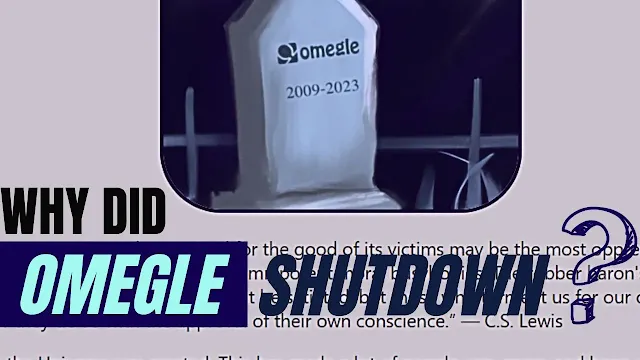Why Did Omegle Shutdown
The End of an Era: Why Did Omegle Shutdown and Its Impact on Online Chatting
Omegle, the once-popular random video chat platform, has officially shut down its doors after 14 years of operation. The decision to close the site came as a surprise to many, given its widespread popularity and enduring appeal. In this article, we delve into the reasons behind the Omegle Shutdown and explore its legacy as a groundbreaking platform in the realm of online communication.
A Brief Overview of Omegle
Omegle emerged in 2009 as a revolutionary platform for connecting strangers through random video chats. With its simple interface and lack of registration requirements, Omegle quickly gained popularity, attracting millions of users worldwide. The platform's anonymity and spontaneity fueled its allure, enabling users to engage in unfiltered conversations with people from all walks of life.
The Rise of Concerns and Controversies
Despite its initial success, Omegle faced increasing criticism and controversy over the years. The platform's lack of moderation and emphasis on anonymity made it a breeding ground for inappropriate content, including cyberbullying, harassment, and exposure to minors. These concerns intensified as the platform gained popularity among younger users.
Factors Leading to Omegle Shutdown
The decision to shut down Omegle stemmed from a combination of factors, including the mounting pressure from critics, the financial burden of maintaining the site, and the founder's personal struggles with managing the platform's negative impacts. In a statement, Omegle founder Leif K-Brooks expressed his frustration with the site's misuse and the emotional toll it had taken on him.
Omegle, the popular random video chat platform, shut down on November 9, 2023, after 14 years of operation. The platform's founder, Leif K-Brooks, cited a combination of factors, including:
- Mounting Criticism and Controversy: Omegle faced increasing criticism for its lack of moderation and emphasis on anonymity, which made it a breeding ground for inappropriate content, cyberbullying, harassment, and exposure to minors. These concerns were particularly concerning as the platform gained popularity among younger users.
- Financial Strain: Maintaining Omegle's servers and dealing with the fallout from its misuse were financially draining for K-Brooks, who operated the platform as a solo venture.
- Emotional Toll: The negative attention and pressure of managing Omegle's challenges took a significant emotional toll on K-Brooks. He expressed frustration and exhaustion in his statement announcing the shutdown.
- Lack of Viable Solutions: K-Brooks had attempted to address the platform's issues by implementing stricter moderation measures and introducing child safety features. However, these efforts were met with mixed results and failed to fully mitigate the problems.
- Difficulty Striking a Balance: Omegle's core concept of anonymous random video chat was inherently challenging to moderate effectively. The platform's appeal was rooted in its unfiltered nature, making it difficult to strike a balance between enabling genuine connections and preventing misuse.
In the end, K-Brooks concluded that the negative aspects of Omegle outweighed its positive potential, and he made the difficult decision to shut down the platform. Omegle's closure serves as a cautionary tale about the challenges of operating online platforms and the importance of user safety and adequate moderation.
Omegle's Legacy and Impact
Despite its shortcomings, Omegle played a significant role in shaping the landscape of online communication. It pioneered the concept of anonymous random video chat, paving the way for numerous imitators and influencing the development of other social media platforms. Omegle's legacy extends beyond its technological innovations; it also served as a social experiment, providing a window into the human experience of connecting with strangers in a virtual setting.
The Future of Online Chatting
Omegle's closure marks the end of an era in online chatting, but its impact is likely to be felt for years to come. The platform's popularity highlighted the demand for spontaneous and anonymous communication, and its demise underscores the need for effective moderation and user protection measures in online spaces.
Conclusion
Omegle's story serves as a cautionary tale about the challenges and responsibilities of operating online platforms. While it provided a unique platform for connection and self-expression, its lack of safeguards allowed for misuse and ultimately led to its downfall. As we move forward in the digital age, it is crucial to strike a balance between open communication and responsible moderation to ensure that online spaces remain safe and welcoming for all.

